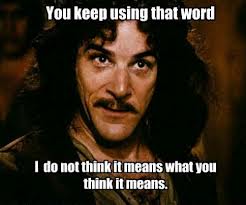No, the U.S. government is not subject to the laws of God or the Bible or Christian orthodoxy. We have never been a Christian nation. In fact, we specifically, consciously, and vocally voted down any efforts to that end. We learned from the British experiment (and all of history from the time of Constantine), that wedding the church to the government is deadly both for government and for the church, and we decided to keep the church–it’s theology, power structure, and religious commitment–outside of the political process. We opted to become a democracy in which each citizen of whatever religion or non-religion has the right to vote, to express his or her opinions, and try to sway fellow citizens to bring change in the way each sees best.
This is my major disagreement with the stand taken by Christianity Today and the hundred evangelicals who signed a response to the Supreme Court’s decision to legalize gay marriage. It reads in part, “no human institution has the authority to redefine marriage any more than a human institution has the authority to redefine the gospel.” It is this kind of confusion of political and theological constructs that leads to all sorts of mischief. Most clearly and definitely it is the responsibility of the government to define a social construct (marriage) that impacts literally thousands of laws and policies impacting all citizens. As a private citizen, each of us may support or fight that particular definition, but to suggest that such a definition is outside the purview of government is to largely misunderstand the nature of a secular democracy. The content of the gospel has no such role in government policy–everyone acknowledges that it is entirely a religious matter.
When I say that confusing politics and theology leads to mischief, I think gay marriage is the perfect example of this. A great part of the problem comes from identifying holy matrimony with government sanctioned marriage. They are (or should be) completely independent statuses. The church has every right to determine the kinds of relationships in society that it will sanction and those it will not, that is, sanction as a church, religiously. It is when we try to take over control of the political mechanism to enforce this on others that they cry foul. “Sure,” they say, “marry whomever you wish, but in return let us marry whomever we wish.” If we as a church think their marriage choice is a bad one (morally or any other way) we may deny within our religious context the legitimacy of that marriage–that is the free exercise of our religion. But to deny them the exercise of their religious convictions outside our religious context is to usurp the whole meaning of the first amendment. We in essence are saying, only our own religious convictions are legitimate and yours are not.
Interestingly enough, this same principle plays out in theology as well. In a secular democracy, we cannot force others to believe as we do or to live by our religious convictions. At most we can sanction them with reference to our religious hierarchy (excommunicate, impose church discipline, remove them from membership in our theological society, refuse them our services). We cannot (thankfully) jail them or burn them at the stake because the roles of church and government have been separated.
Naturally our theology informs our legal convictions, and we may as individuals try to pass laws upholding these convictions, but in a secular democracy, we must allow that same right to those who disagree with us. We cannot trump them legally because our beliefs are from the Bible (would we really want a church-run government as this would entail?).
Pragmatically, if you disagree with gay marriage, may I suggest that instead of trying to control the meaning of “marriage” and take on a losing fight, you allow society to define it as it decides and simply begin to see that social institution as an otherwise secular description of a legal partnership unrelated to your conception of marriage. If we do not wish society to define marriage for us, then the best option is not to try to coerce them to agree, but to simply recognize that what the church sanctions has little to do with what the world sanctions–a legal marriage has no necessary connection to a church marriage. After all, if you are married in a church but do not file a government marriage certificate, you are not married in the eyes of the law.
Let us use our religious convictions to guide our own lives and fight for our right to those convictions without the easy assumption that if I believe it strongly enough, I should try to legislate those convictions on everyone. Living by my convictions and forcing others to live by my convictions are two very different belief structures that have divergent foundational arguments, and if you believe in a secular democracy, the scope of the second will be far smaller than the first.
